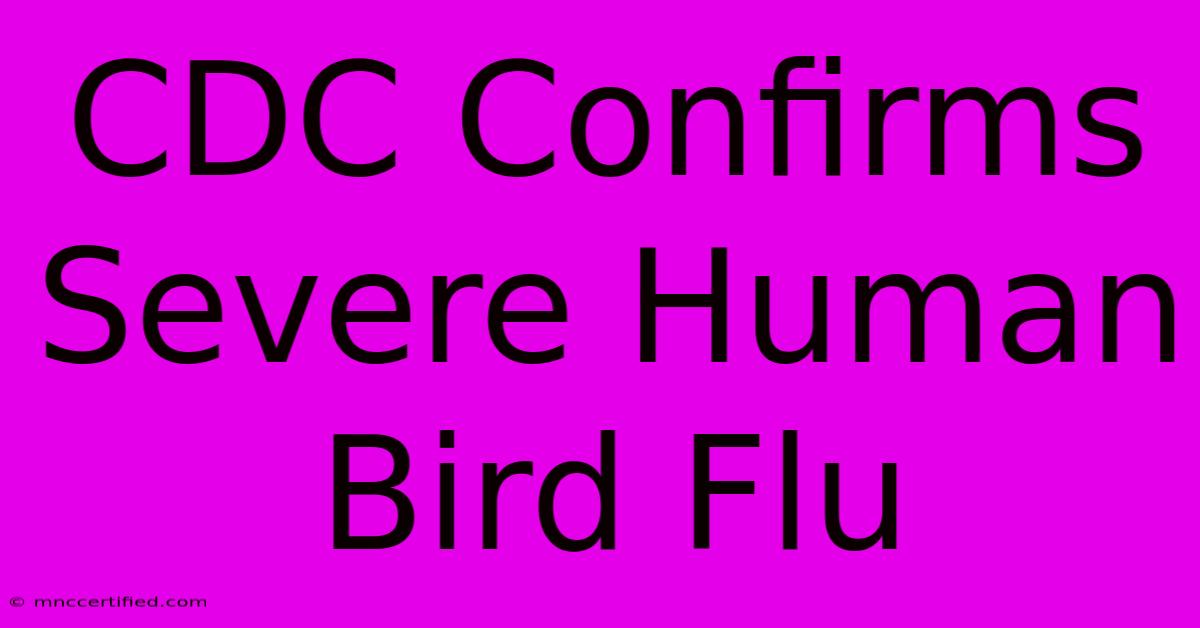CDC Confirms Severe Human Bird Flu

Table of Contents
CDC Confirms Severe Human Case of Bird Flu: What You Need to Know
The Centers for Disease Control and Prevention (CDC) has confirmed a severe human case of avian influenza A(H5N1), raising concerns about the potential for a wider outbreak. While bird flu outbreaks are not uncommon, this confirmation highlights the importance of understanding the virus, its transmission, and the preventative measures we can take. This article will delve into the details surrounding this recent case and provide essential information to protect yourself and your community.
Understanding Avian Influenza A(H5N1)
Avian influenza, commonly known as bird flu, is caused by viruses that primarily infect birds. The H5N1 strain is particularly concerning due to its potential to cause severe illness and even death in humans. While human-to-human transmission is rare, the possibility remains a significant public health concern. Key characteristics of H5N1 include:
- High mortality rate: A significant percentage of those infected with H5N1 have experienced severe complications and death.
- Respiratory symptoms: Symptoms often resemble those of the flu, including fever, cough, sore throat, and muscle aches. However, H5N1 can also present with more severe complications like pneumonia.
- Limited human-to-human transmission: While rare, the potential for human-to-human transmission exists and necessitates close monitoring and preventative measures.
The CDC's Confirmation and its Implications
The recent confirmation by the CDC underscores the ongoing threat posed by avian influenza. While specific details about the individual case may be limited due to patient privacy, the confirmation itself serves as a critical reminder of the need for:
- Increased surveillance: The CDC and other global health organizations are likely to intensify surveillance efforts to detect and contain potential outbreaks.
- Enhanced public health measures: Public health agencies might implement stricter measures, such as increased testing and quarantine procedures, to prevent further spread.
- Improved public awareness: Understanding the risks and preventative measures is crucial in mitigating the potential impact of a wider outbreak.
What to do if you suspect a Bird Flu Infection:
If you experience flu-like symptoms, especially after contact with birds or poultry, seek immediate medical attention. Inform your doctor about your potential exposure to birds to ensure proper diagnosis and treatment. Early detection and treatment are critical in managing the severity of the illness.
Preventing the Spread of Avian Influenza
Preventing the spread of avian influenza requires a multifaceted approach, including:
- Avoiding contact with birds: Avoid contact with wild birds, especially sick or dead ones. If you must handle poultry, wear appropriate protective gear, such as gloves and masks.
- Practicing good hygiene: Wash your hands frequently with soap and water, especially after contact with birds or poultry.
- Cooking poultry thoroughly: Ensure poultry is cooked to an internal temperature of 165°F (74°C) to kill any potential viruses.
- Staying informed: Stay updated on the latest information and guidelines from the CDC and other reputable health organizations.
The Role of Global Collaboration in Combating Bird Flu
Combating avian influenza effectively requires strong international collaboration. Sharing information, research findings, and resources across borders is essential for rapid response and effective containment of outbreaks. Global health organizations play a crucial role in coordinating these efforts and providing support to countries most affected.
Conclusion: Staying Vigilant Against Bird Flu
The CDC's confirmation of a severe human case of avian influenza serves as a stark reminder of the ongoing threat posed by this virus. While the risk of a widespread pandemic remains relatively low, vigilance and proactive preventative measures are crucial. By understanding the virus, its transmission, and the steps we can take to protect ourselves, we can collectively mitigate the potential impact of future outbreaks. Staying informed through reputable sources like the CDC website is vital in staying safe and contributing to public health efforts. Remember, early detection and appropriate response are key to managing this serious health concern.

Thank you for visiting our website wich cover about CDC Confirms Severe Human Bird Flu. We hope the information provided has been useful to you. Feel free to contact us if you have any questions or need further assistance. See you next time and dont miss to bookmark.
Featured Posts
-
Step Into Christmas Elton John Video
Dec 19, 2024
-
Farage Claims Musks Support
Dec 19, 2024
-
When Is The Next Mega Millions Lottery
Dec 19, 2024
-
Delevingne Stars In Christmas Video
Dec 19, 2024
-
Bridgewater A Team Rules Him Out
Dec 19, 2024